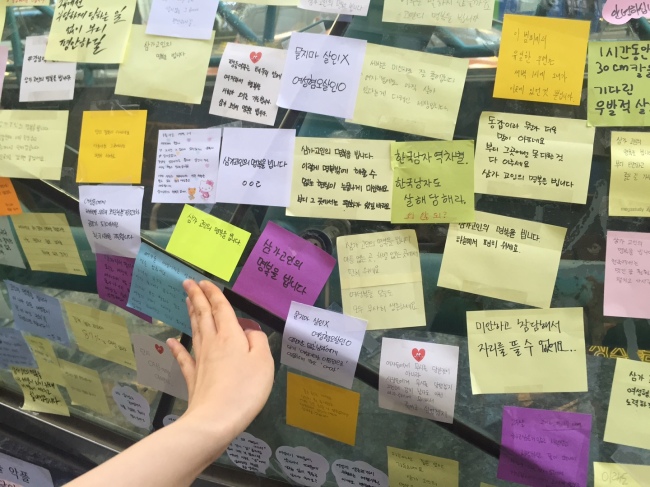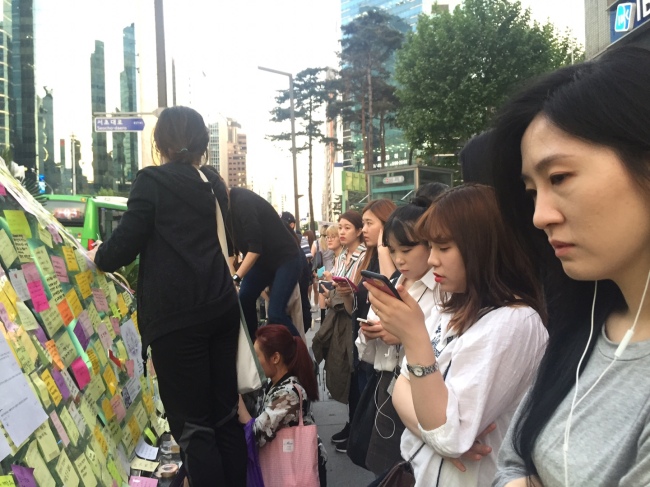The recent murder of a 23-year-old woman at the hands of a man with a history of schizophrenia in Seoul’s Gangnam district has triggered debate on misogyny and mental illness here.
The 34-year-old suspect told the police earlier this week that he committed the crime because he had been “belittled by women” many times in the past. The victim and the suspect had no prior contact with each other prior to the incident that occurred Tuesday.
While police announced Thursday that the case should not be perceived as a hate crime against women, as the suspect suffers from a serious level of mental illness, many online commenters have argued otherwise.
 |
Visitors pay tribute to a 23-year-old woman in an alleged hate crime, near exit 10 of Gangnam Station on Wednesday. (Claire Lee/ The Korea Herald) |
Of the dissenting public is popular psychiatrist Suh Cheon-seok, who claimed that mental illness is often a result of social and political environment that each of the afflicted belongs to. For instance, many sufferers of mental disorders had paranoid thoughts of being shadowed by the Korean Central Intelligence Agency in the 1960s when the nation was governed by an authoritarian regime, he said.
“Even if his misogynist remarks were triggered by his delusional thoughts, we have to make a note that his delusional thoughts were affected by the social climate that is hostile against women,” Suh wrote through his Facebook account.
“We can’t conclude that this case is not a misogynistic crime because the suspect is mentally ill. Rather, we have to take it seriously that misogynist behavior is becoming one of the symptoms of mental illness. If the suspect did not live in a society where misogyny prevails, he would have had other kinds of delusions, rather than the one of being belittled by women.”
Mental illness has been largely taboo in South Korea, where social stigma against people with mental illnesses still prevails.
According to a report released by the National Evidence-based Healthcare Collaborating Agency last year, about 5.6 percent of the Korean population -- over 2 million people -- have suffered depression at least once in their lives. However, only 290,000 people had sought medical help for the condition as of last year, and an even smaller number of them, 150,000 chose to receive treatment regularly.
Regardless of the collective avoidance of psychiatric treatment among Koreans, studies overseas have shown that mental illness is not usually linked to violent crime.
In an American study of crimes committed by 143 offenders with serious mental disorders, only 7.5 percent were directly related to symptoms of mental illness, according to a 2014 study published by the American Psychological Association. Suh also mentioned that the number of mentally ill individuals who commit crimes is much lower worldwide than those who don’t have any mental conditions.
Suh’s claim came in rebuttal to politicians including crime psychologist-turned-lawmaker Pyo Chang-won, who claimed the recent Gangnam murder could not be classified as a misogynistic crime due to the suspect’s mental condition. Another lawmaker, Kim Kwang-jin, said Korea should make efforts to prevent hate crimes against “all minorities,” not just women.
Gender Minister Kang Eun-hee, who visited the tribute site in Gangnam on Friday, also said it is “inappropriate” to call the specific case as a hate crime against women at this point. More investigation by the police, as well as a thorough examination of the suspect’s mental condition, will be needed to decide whether the case should be considered as a misogynist crime or not, she said.
 |
Women pay tribute to a 23-year-old woman in an alleged hate crime, near exit 10 of Gangnam Station on Wednesday. (Claire Lee/ The Korea Herald) |
The opinion split has also sparked backlash among foreign nationals here, who claim to have witnessed many cases of gender-based violence and discrimination while living here. Last year, 87 percent of all victims of violent crimes, including rape and murder, reported from January until August were women, according to data from the National Police Agency.
“As someone with friends who have been treated for various mental health issues, I find it rather disgusting that the police say ‘well, a mental illness caused him to feel this way,’” a 29-year-old American English teacher in Seoul said. “It’s all so easy to blame mental illness, but mental illness doesn’t make a person a misogynist.”
The teacher also said there is a parallel between the Gangnam murder case and mass shooting sprees in the U.S., in which she thinks the connection between violence and severe mental illness is often exaggerated to ignore other important factors that may have caused the crimes.
“People don’t want to talk about societal and cultural issues that contribute to crimes like the one in Gangnam, and shooting sprees in America,” she said.
“Instead, they take the easy way out -- ‘Oh well, he had a mental health issue’ -- and choose to disregard the serious problem. In this murder case in Gangnam, it was the massive gender disparity issue in Korea.”
By Claire Lee (
dyc@heraldcorp.com)









